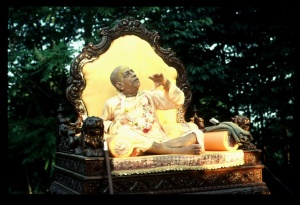SB 11.18.42: Difference between revisions
m (1 revision(s)) |
No edit summary |
||
| Line 1: | Line 1: | ||
{{info | {{info | ||
|speaker=Lord | |speaker=Lord Kṛṣṇa the Supreme Personality of Godhead | ||
|listener=Uddhava | |listener=Uddhava | ||
}} | }} | ||
[[Category:Srimad-Bhagavatam - Canto 11 Chapter 18]] | |||
[[Category:Bhagavatam Verses Spoken by Lord Krsna - Vanisource|111842]] | |||
<div style="float:left">'''[[Srimad-Bhagavatam]] - [[SB 11|Eleventh Canto]] - [[SB 11.18: Description of Varnasrama-dharma|Chapter 18: Description of Varṇāśrama-dharma]]'''</div> | |||
<div style="float:right">[[File:Go-previous.png|link=SB 11.18.40-41]] '''[[SB 11.18.40-41]] - [[SB 11.18.43]]''' [[File:Go-next.png|link=SB 11.18.43]]</div> | |||
{{RandomImage}} | |||
{{SBnotice}} | |||
==== TEXT 42 ==== | ==== TEXT 42 ==== | ||
<div | <div class="verse"> | ||
bhikṣor dharmaḥ śamo 'hiṁsā | :bhikṣor dharmaḥ śamo 'hiṁsā | ||
tapa īkṣā vanaukasaḥ | :tapa īkṣā vanaukasaḥ | ||
gṛhiṇo bhūta-rakṣejyā | :gṛhiṇo bhūta-rakṣejyā | ||
dvijasyācārya-sevanam | :dvijasyācārya-sevanam | ||
</div> | </div> | ||
| Line 17: | Line 22: | ||
==== SYNONYMS ==== | ==== SYNONYMS ==== | ||
<div | <div class="synonyms"> | ||
bhikṣoḥ—of a sannyāsī; dharmaḥ—the main religious principle; | bhikṣoḥ—of a sannyāsī; dharmaḥ—the main religious principle; śamaḥ—equanimity; ahiṁsā—nonviolence; tapaḥ—austerity; īkṣā—discrimination (between the body and the soul); vana—in the forest; okasaḥ—of one dwelling, a vānaprastha; gṛhiṇaḥ—of a householder; bhūta-rakṣā—offering shelter to all living entities; ijyā—performance of sacrifice; dvi-jasya—of a brahmacārī; ācārya—the spiritual master; sevanam—serving. | ||
</div> | </div> | ||
{{SBcollapse}} | |||
==== TRANSLATION ==== | ==== TRANSLATION ==== | ||
<div | <div class="translation"> | ||
The main religious duties of a sannyāsī are equanimity and nonviolence, whereas for the vānaprastha austerity and philosophical understanding of the difference between the body and soul are prominent. The main duties of a householder are to give shelter to all living entities and perform sacrifices, and the brahmacārī is mainly engaged in serving the spiritual master. | The main religious duties of a sannyāsī are equanimity and nonviolence, whereas for the vānaprastha austerity and philosophical understanding of the difference between the body and soul are prominent. The main duties of a householder are to give shelter to all living entities and perform sacrifices, and the brahmacārī is mainly engaged in serving the spiritual master. | ||
</div> | </div> | ||
| Line 31: | Line 36: | ||
==== PURPORT ==== | ==== PURPORT ==== | ||
<div | <div class="purport"> | ||
The brahmacārī lives in the āśrama of the spiritual master and personally assists the ācārya. Householders generally are entrusted with the performance of sacrifice and Deity worship and should provide maintenance for all living entities. The vānaprastha must clearly understand the difference between body and soul in order to maintain his status of renunciation, and he should also perform austerities. The sannyāsī should fully absorb his body, mind and words in self-realization. Having thus achieved equanimity of mind, he is the best well-wisher of all living entities. | The ''brahmacārī'' lives in the ''āśrama'' of the spiritual master and personally assists the ''ācārya''. Householders generally are entrusted with the performance of sacrifice and Deity worship and should provide maintenance for all living entities. The ''vānaprastha'' must clearly understand the difference between body and soul in order to maintain his status of renunciation, and he should also perform austerities. The ''sannyāsī'' should fully absorb his body, mind and words in self-realization. Having thus achieved equanimity of mind, he is the best well-wisher of all living entities. | ||
</div> | </div> | ||
__NOTOC__ | </div> | ||
</div> | |||
<div style="float:right">[[File:Go-previous.png|link=SB 11.18.40-41]] '''[[SB 11.18.40-41]] - [[SB 11.18.43]]''' [[File:Go-next.png|link=SB 11.18.43]]</div> | |||
__NOTOC__ | |||
__NOEDITSECTION__ | |||
Revision as of 17:24, 1 July 2021

A.C. Bhaktivedanta Swami Prabhupada
Please note: The synonyms, translation and purport of this verse were composed by disciples of Śrīla Prabhupāda
TEXT 42
- bhikṣor dharmaḥ śamo 'hiṁsā
- tapa īkṣā vanaukasaḥ
- gṛhiṇo bhūta-rakṣejyā
- dvijasyācārya-sevanam
SYNONYMS
bhikṣoḥ—of a sannyāsī; dharmaḥ—the main religious principle; śamaḥ—equanimity; ahiṁsā—nonviolence; tapaḥ—austerity; īkṣā—discrimination (between the body and the soul); vana—in the forest; okasaḥ—of one dwelling, a vānaprastha; gṛhiṇaḥ—of a householder; bhūta-rakṣā—offering shelter to all living entities; ijyā—performance of sacrifice; dvi-jasya—of a brahmacārī; ācārya—the spiritual master; sevanam—serving.
Translation and purport composed by disciples of Śrīla Prabhupāda
TRANSLATION
The main religious duties of a sannyāsī are equanimity and nonviolence, whereas for the vānaprastha austerity and philosophical understanding of the difference between the body and soul are prominent. The main duties of a householder are to give shelter to all living entities and perform sacrifices, and the brahmacārī is mainly engaged in serving the spiritual master.
PURPORT
The brahmacārī lives in the āśrama of the spiritual master and personally assists the ācārya. Householders generally are entrusted with the performance of sacrifice and Deity worship and should provide maintenance for all living entities. The vānaprastha must clearly understand the difference between body and soul in order to maintain his status of renunciation, and he should also perform austerities. The sannyāsī should fully absorb his body, mind and words in self-realization. Having thus achieved equanimity of mind, he is the best well-wisher of all living entities.